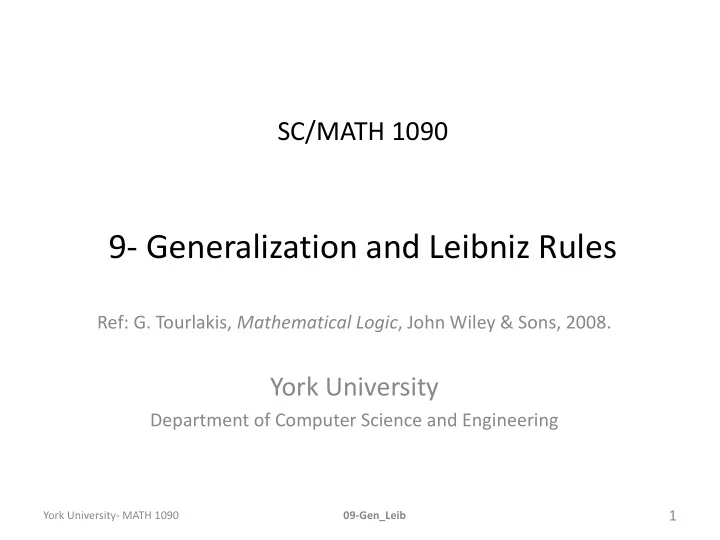

SC/MATH 1090 9- Generalization and Leibniz Rules Ref: G. Tourlakis, Mathematical Logic , John Wiley & Sons, 2008. York University Department of Computer Science and Engineering 1 York University- MATH 1090 09-Gen_Leib
Overview • Insert/Remove the universal quantifier – Weak generalization Metatheorem – Specialization rule • The Leibniz Rules – Boolean Leib (BL) – Weak Leib (unconditional) – Strong Leib (conditional) York University- MATH 1090 09-Gen_Leib 2
Weak Generalization • Metatheorem. (Weak Generalization) If ⊢ A and moreover x does not occur free in any formula in the set , then ⊢ ( x) A. – Note x can be free in A. – Proof by induction on length of a -proof of A in Logic(2). • Corollary . If ⊢ A and moreover x does not occur free in any formula used in the proof , then ⊢ ( x) A. • Corollary . If ⊢ A, then ⊢ ( x)A. York University- MATH 1090 09-Gen_Leib 3
NEVER Strong Generalization! • NEVER Correct: Strong generalization: A ⊢ ( x)A • To be able to generalize A, we must have a proof for A. • If A is an assumption, and not proven, we are not allowed to generalize. • Strong generalization is SO WRONG that to show a formula X is not provable, it is sufficient to show that X can be used to prove strong generalization (Chapter 8). York University- MATH 1090 09-Gen_Leib 4
Specialization Rule • Metatheorem . (Specialization Rule) ( x)A ⊢ A[x:=t] – Note: The above rule is applicable ONLY if the substitution is defined • Corollary . ( x)A ⊢ A York University- MATH 1090 09-Gen_Leib 5
Remove/ Insert ( x) • A simple template for some Hilbert proofs in 1 st order Logic: 1. Use spec to remove the universal quantifiers in the assumptions. 2. Use simple Boolean Logic techniques we learned in previous chapters. 3. Use (weak) gen to insert back the universal quantifiers provided gen CONDITION . York University- MATH 1090 09-Gen_Leib 6
Examples • ( x)( y)A ( y)( x)A • ( x)(A B) ( x)A ( x)B Distributivity of over • Metatheorem. ( -monotonicity) Provided x dnof in any formula in , if ⊢ A B then ⊢ ( x)A ( x)B . – Corollary . If ⊢ A B then ⊢ ( x)A ( x)B. – Corollary . If ⊢ A B then ⊢ ( x)A ( x)B, provided x dnof in any formula in . – Corollary . If ⊢ A B then ⊢ ( x)A ( x)B. York University- MATH 1090 09-Gen_Leib 7
Weak Leibniz (WL) • Metatheorem. (Weak Leibniz) If ⊢ A B, then ⊢ C[p\A] C[p\B]. – Proof by induction on the complexity of C. – Also called "Weak Leib with unconditional substitution“ – Note we DONOT have Strong Leib with unconditional substitution: A B ⊢ C[p\A] C[p\B] (WRONG!) • Corollary. (A more generous WL) If ⊢ A B and none of the bound variables of C occur free in formulae of , then ⊢ C[p\A] C[p\B]. York University- MATH 1090 09-Gen_Leib 8
Strong Leibniz (SL) • Metatheorem. (Strong Leibniz) A B ⊢ C[p:=A] C[p:=B] – Proof by induction on the complexity of C. – Also called “ Strong Leib with conditional substitution“ • Example: D (A B) ⊢ D (C[p:=A] C[p:=B]) • Exercise: D ◦ (A B) ⊢ D ◦ (C[p:=A] C[p:=B]) York University- MATH 1090 09-Gen_Leib 9
Important Tools • ⊢ ( x)(A B) A ( x)B, provided x dnof in A. • ⊢ ( x)(A B) A ( x)B, provided x dnof in A. • ⊢ ( x)(A B) A ( x)B, provided x dnof in A. York University- MATH 1090 09-Gen_Leib 10
Examples 1) ( x)( A) ┬ Empty range 2) ⊢ ( x) (x=t A) A[x:=t] provided x not free in t One point rule 3) ⊢ ( x) (x=t A) A[x:=t] provided x not free in t One point rule- -version York University- MATH 1090 09-Gen_Leib 11
Examples (2) 4) ⊢ ( x)(A B) ( x)(A C) ( x)(A B C) ⊢ ( x) A B ( x) A C ( x) A (B C) • Or • - version (dual of above): 5) ⊢ ( x)(A B) ( x)(A C) ( x)(A (B C)) ⊢ ( x) A B ( x) A C ( x) A (B C) • Or York University- MATH 1090 09-Gen_Leib 12
Examples (3) ⊢ ( x) A B C ( x) A C ( x) B C 6) Range Split ⊢ ( x) A ( y) B C ( y) B ( x) A C 7) provided y not free in A and x not free in B Interchange of dummies ⊢ ( x) A ( y) B C ( y) B ( x) A C 8) provided y not free in A and x not free in B Dual of above ( x) ( y) A B C ( x) A ( y) B C 9) provided y not free in A Nesting 10) ( x) ( y) A B C ( x) A ( y) B C provided y not free in A Dual of above York University- MATH 1090 09-Gen_Leib 13
Dummy Renaming • Theorem. (Dummy Renaming for ) If z does not occur in A (free nor bound), then ⊢ ( x)A ( z)A[x:=z]. • Theorem. (Dummy Renaming for ) If z does not occur in A (free nor bound), then ⊢ ( x)A ( z)A[x:=z]. York University- MATH 1090 09-Gen_Leib 14
Recommend
More recommend